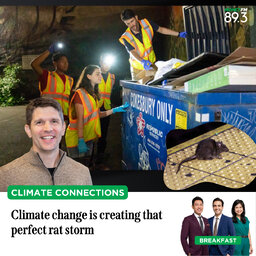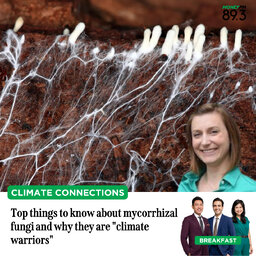Climate Connections: Living with lions: Clawing at the human-wildlife conflict up close & personal in Botswana
Lions are the apex predators of the African savanna, or what ecologists call - a keystone species.
They play the critical role of managing large herbivore populations of impalas, zebras, buffalos, and even elephants and giraffes. In a balanced ecosystem, the number of herbivores needs to be kept in check because if you have too many herbivores, vegetation will be overgrazed and habitats will inevitably degrade.
As an umbrella species, lions also help maintain a healthy and resilient herbivore population and regulate disease transmissions because they typically hunt and kill those that may be afflicted with parasites, disease or are feeble from a hereditary defect.
Without lions, disease spread is more likely across species, and vast savanna grassland ecosystems would disintegrate into dysfunctional, barren landscapes impacting all other species, including humans.
However, African lion populations are declining - due in large part to habitat loss due to development and human-wildlife conflict. With humans now living closer to predators like lions, having mitigation measures to reduce that conflict is growing in importance as these predators also pose a threat to the local communities and their livestock.
On this episode of Climate Connections, Dr Jess Isden, Coexistence Coordinator, WildCRU - who is working very closely with the local communities through the Trans-Kalahari Predator Programme - shares her insights on how effective human-lion conflict mitigation strategies in Botswana, Africa, can contribute to sustainable development.
Feature produced and edited by: Yeo Kai Ting (ykaiting@sph.com.sg)
Voiced by: Audrey Siek
Photo credits: Yeo Kai Ting
Music credits: pixabay & its talented community of contributors, Hayashi Yu, Makooto
In 3 playlist(s)
Climate Connections
A special segment on MONEY FM 89.3's Breakfast Show that brings you on an exclusive audio journey to…Social links
Follow podcast
Recent clips

Climate Connections: Why do the pH levels of the early oceans matter? And what does it tell us about Earth’s evolving habitability in the broader context of climate change?
13:01

Climate Connections: Climate change is creating that perfect rat storm
16:53

Climate Connections: Top things to know about mycorrhizal fungi and why they are "climate warriors"
14:44
 Climate Connections
Climate Connections

